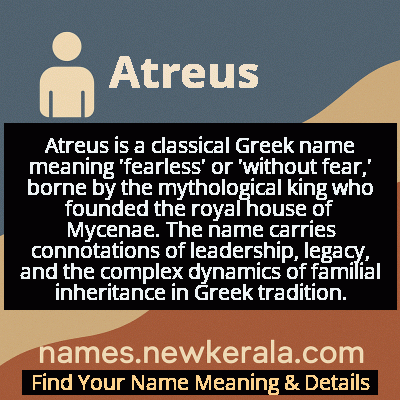Atreus Name Meaning & Details
Origin, Popularity, Numerology Analysis & Name Meaning of Atreus
Discover the origin, meaning, and cultural significance of the name ATREUS. Delve into its historical roots and explore the lasting impact it has had on communities and traditions.
Name
Atreus
Gender
Male
Origin
Greek
Lucky Number
3
Meaning of the Name - Atreus
Atreus is a classical Greek name meaning 'fearless' or 'without fear,' borne by the mythological king who founded the royal house of Mycenae. The name carries connotations of leadership, legacy, and the complex dynamics of familial inheritance in Greek tradition.
Atreus - Complete Numerology Analysis
Your Numerology Number
Based on Pythagorean Numerology System
Ruling Planet
Jupiter
Positive Nature
Optimistic, inspirational, and creative.
Negative Traits
Scattered, exaggerating.
Lucky Colours
Yellow, gold, purple.
Lucky Days
Thursday.
Lucky Stones
Yellow sapphire.
Harmony Numbers
1, 2, 9.
Best Suited Professions
Arts, writing, communication.
What People Like About You
Creativity, optimism.
Famous People Named Atreus
Atreus of Mycenae
Mythological King
Founded the Atreid dynasty and fathered Agamemnon and Menelaus
Atreus (God of War)
Video Game Character
Central character in acclaimed God of War series, known as Loki in Norse mythology
Atreus (Literary Figure)
Mythological Character
Key figure in Greek tragedies exploring fate and familial curses
Name Variations & International Equivalents
Click on blue names to explore their detailed meanings. Gray names with will be available soon.
Cultural & Historical Significance
Extended Personality Analysis
The name Atreus suggests a personality marked by strong leadership capabilities, strategic intelligence, and emotional depth. Drawing from the mythological king's legacy, individuals with this name are often perceived as natural leaders who can navigate complex situations with cunning and determination. They tend to possess a strong sense of family loyalty and heritage, though this may come with an awareness of familial burdens or expectations. The modern interpretation, influenced by contemporary portrayals, adds qualities of curiosity, adaptability, and a bridge between traditional wisdom and modern perspectives. These individuals often display resilience in adversity and a capacity for personal growth through challenging circumstances, reflecting the mythological theme of overcoming inherited curses or family patterns through conscious effort and moral development.
Modern Usage & Popularity
In contemporary times, Atreus has transitioned from an obscure mythological reference to an increasingly popular given name, particularly following the 2018 release of the God of War video game. The character's compelling portrayal as the son of Kratos introduced the name to a new generation, making it appealing to parents seeking strong, classical names with modern cultural relevance. While still ranking outside the top 1000 names in most English-speaking countries, its usage has shown steady growth, especially among families with interests in mythology, gaming, or unique classical names. The name maintains an air of sophistication and historical weight while benefiting from positive associations with intelligence, bravery, and character development from its popular culture representation.
Symbolic & Spiritual Meanings
Symbolically, Atreus represents the complex interplay between destiny and free will, serving as a metaphor for how individuals navigate inherited legacies—both positive and burdensome. The name embodies the classical concept of familial curses and the possibility of breaking destructive cycles through conscious choice and moral courage. It also symbolizes the transmission of knowledge and tradition between generations, particularly the father-son relationship dynamic that forms a central theme in both ancient myths and modern interpretations. As a bridge between Greek and Norse mythological traditions in contemporary media, Atreus has come to represent cultural synthesis and the universal nature of heroic journeys across different belief systems and historical periods.

